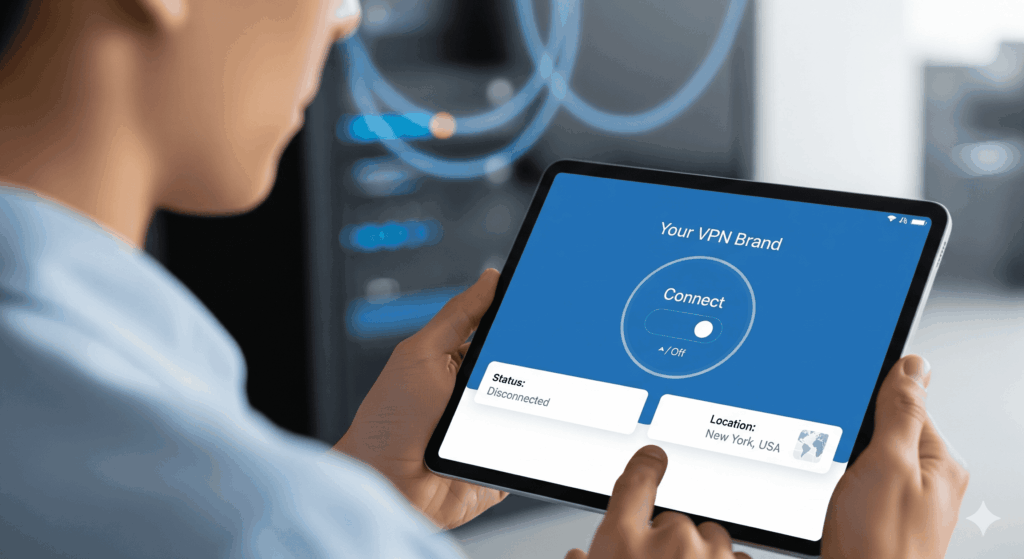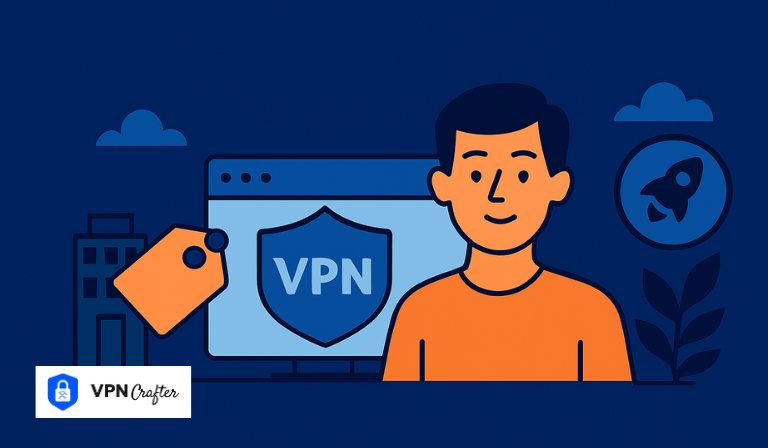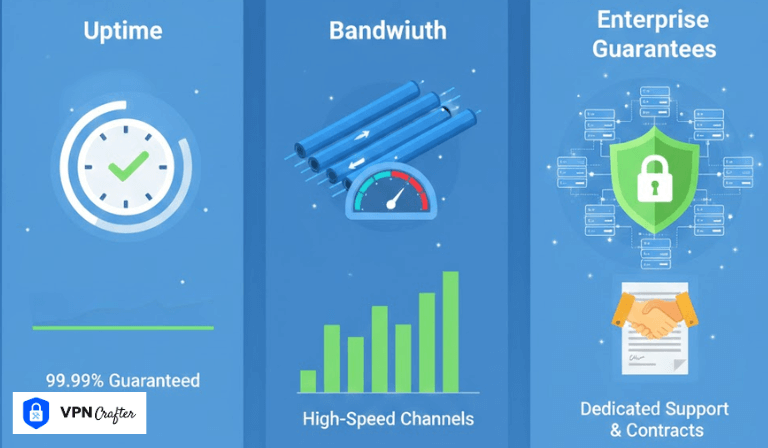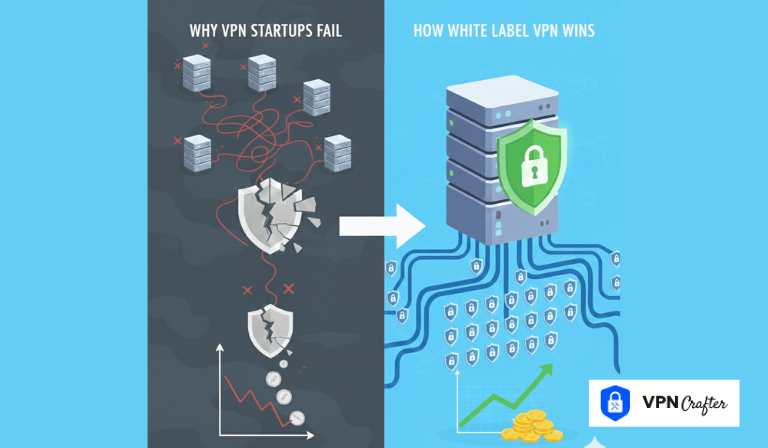Online privacy isn’t a niche concern anymore — it’s table stakes for consumers and companies alike. That’s why the VPN category keeps climbing: analysts estimate the market will roughly double by 2030 (mid-teens to high-teens CAGR), driven by hybrid work, streaming/geoblocking, and regulatory pressure on data protection. Mordor IntelligenceGrand View Research. At the same time, many organizations are modernizing access from “old VPN for everything” to mixed models that pair VPN with Zero Trust and app-level access — making room for fresher, faster clients and protocols in new products.TailscaleUC Today
For founders and product teams, white-label VPN development is the fastest path to ship a trustworthy, cross-platform VPN without building a global network or cryptographic stack from scratch. You leverage a provider’s servers, tunneling, and security protocols (e.g., WireGuard, OpenVPN, IKEv2) while owning the brand, pricing, UX, and support — so you can focus on differentiation and growth instead of rack space and kernel modules. This model is equally attractive whether you’re launching a consumer privacy app, bundling VPN into a broader security suite, or standing up white-label VPN servers for a geo-targeted audience.
Demand is rising, but opportunity isn’t automatic. Consumer awareness is uneven (a sizable share of users still don’t use or understand VPNs), which means your go-to-market must educate as much as it sells — and your product has to feel faster, safer, and simpler than “free VPN” alternatives.Security.org That’s where a thoughtful approach to white-label VPN solutions pays off: modern protocols, clear privacy positioning (no-logs, GDPR/CCPA alignment), responsive apps, and pricing that matches value.
What you’ll get from this guide: a practical blueprint for white-label VPN development — how it works under the hood, the solution types (hosted vs. self-hosted vs. fully managed), features that matter, provider selection criteria, pricing realities, launch and growth playbooks, and common pitfalls to avoid. By the end, you’ll know how to build a credible VPN brand that scales while maintaining user trust and performance.
What is a White-Label VPN?
At its core, a white-label VPN is a ready-made VPN solution that allows you to launch your own privacy-focused service without building the entire VPN infrastructure from scratch. Instead of spending years setting up global servers, developing apps, and maintaining encryption protocols, you partner with a provider that handles the backend operations. You then focus on what really matters for growth: branding, marketing, customer support, and user experience.

Think of it this way: in white-label VPN development, the provider delivers the enterprise-grade security protocols — such as AES-256 encryption, WireGuard, OpenVPN, and IKEv2 — while you control the “front end” of the business:
- Brand Identity – your company name, logo, and app design
- Marketing & Distribution – website, SEO, paid ads, affiliate channels
- Customer Support – billing, subscriptions, and handling technical issues
- User Experience – app interface, onboarding, and loyalty-building
This approach creates a rebranded VPN service that looks and feels like it was built entirely by you — but with the heavy lifting of server maintenance, security updates, and tunneling protocols taken care of.
Here’s a simplified view:
+-----------------------------------+-------------------------------+
| Infrastructure Layer | Branding Layer |
+-----------------------------------+-------------------------------+
| Global VPN servers | App interface design |
| Protocols (WireGuard, OpenVPN) | Brand identity & logo |
| Security & encryption (AES-256) | Marketing & distribution |
| Network uptime & speed | Customer support |
+-----------------------------------+-------------------------------+
This model explains how white-label VPN works for businesses: you can go to market much faster, with a proven VPN infrastructure, while keeping control over your pricing model, brand voice, and customer relationships. Compared to building a VPN from scratch — which demands deep expertise in cryptography, server deployment, and compliance — a white-label approach is lower risk, faster, and more scalable.
How White-Label VPNs Work
When companies consider white-label VPN development, one of the first questions is: how does it actually work in practice? Understanding the technical and operational workflow helps founders, IT teams, and marketers evaluate whether this model is right for them. Let’s break it down step by step and look at how white-label VPN works for businesses from the ground up.

1. Infrastructure Setup: Global Servers & Encryption
At the core of any VPN service is its server infrastructure. White-label providers maintain globally distributed VPN servers with high-speed bandwidth, redundancy, and secure data centers. These servers are configured with enterprise-grade encryption standards such as AES-256, and modern tunneling protocols like WireGuard, OpenVPN, and IKEv2, ensuring both speed and security. By tapping into this infrastructure, businesses avoid the heavy cost of deploying their own hardware and still offer users seamless global coverage.
2. App Customization & Branding
Once the backbone is in place, the focus shifts to the user-facing app experience. With white-label VPN solutions, businesses can fully customize apps with their brand identity — logos, color schemes, onboarding flows, and feature sets. These apps are typically supported across all major platforms: Windows, macOS, iOS, Android, and browser extensions. Customization allows businesses to deliver a unique, branded VPN service while relying on the provider’s battle-tested codebase.
3. Marketing & Distribution Channels
The technology alone isn’t enough. To build traction, businesses need to invest in marketing and distribution. A white-label VPN strategy often includes:
- Optimized websites with SEO targeting keywords like best VPN for privacy, fast VPN apps, or VPN for businesses.
- Paid advertising campaigns across Google, LinkedIn, and social channels.
- Affiliate partnerships and influencers to drive user adoption.
This is where companies can differentiate themselves: by positioning their VPN service for specific niches (e.g., streaming, gaming, enterprise security).
4. Customer Support & Operations
Behind the scenes, businesses must also manage customer support and billing systems. White-label VPN providers usually supply APIs or integrations for subscription management, payment gateways, and automated renewals. The business owner can either outsource support to the provider or build their own helpdesk. Handling user queries, troubleshooting, and billing issues effectively is key to long-term retention.
In short, how white-label VPN works for businesses is a blend of shared infrastructure and unique branding. The provider delivers the secure backbone (servers, encryption, and protocols), while the business focuses on branding, customer acquisition, and user experience. This model shortens time-to-market and gives businesses an immediate entry into the growing VPN industry without reinventing the wheel.
Types of White-Label VPN Solutions
When exploring white-label VPN development, one of the most important decisions is choosing the right VPN business model. The type of solution you select directly impacts your time-to-market, technical complexity, scalability, and ROI. Below are the most common VPN hosting options and solution types available today:
1. Stand-Alone Solution
This is the most advanced form of scalable VPN solution, where the provider gives you the full source code. You gain complete control over servers, features, and branding, which means higher ROI potential. However, it requires a strong technical team to manage updates, patch vulnerabilities, and ensure compliance with data protection laws. This option is best for companies that want deep customization and long-term ownership.
2. Hosted Solution
In this model, the white-label VPN provider handles infrastructure (servers, protocols, security) while you focus on branding, UX, and customer acquisition. It offers easy setup and a much faster time-to-market than building from scratch. This is often the first step for startups testing the waters in the VPN industry before scaling into more complex models.
3. Fully Managed VPN
Here, the provider manages all backend operations — servers, customer support, security patches, and even analytics. You simply rebrand the VPN app and launch under your business identity. This option is perfect for non-technical entrepreneurs or companies who want to quickly expand into the privacy/security market without heavy investment in infrastructure.
4. Self-Managed / Self-Hosted VPN
A self-managed VPN gives you greater control over infrastructure and data sovereignty. You or your team deploy and manage the servers, security protocols, and dashboards. While this offers better flexibility and transparency, it requires technical expertise and ongoing maintenance. This is ideal for companies that want to maintain strict compliance and data governance.
5. API-Based VPN Integration
With API-based VPN integration, businesses can add VPN functionality into their existing platforms or mobile apps. For example, a cybersecurity company can add VPN as a feature inside its suite. This model provides flexibility and allows companies to upsell VPN services without creating a standalone product.
6. OEM / Rebrand-Ready Apps
These are pre-built VPN applications optimized for multiple platforms (Windows, macOS, iOS, Android). You simply rebrand the apps with your logo, colors, and pricing structure. This model shortens the launch timeline and is one of the easiest ways to start offering a white-label VPN service.
7. Enterprise / Business VPN
Designed for organizations, this solution supports multi-user management, centralized dashboards, and custom policies. It allows companies to provide secure connections for their employees across remote locations. Enterprise VPNs often integrate with Zero Trust and SSO systems, making them essential for modern workplaces.
8. Hybrid VPN
As the name suggests, hybrid VPN solutions combine elements of fully managed and self-managed VPNs. For example, you may rely on a provider’s global servers but run your own authentication system. This offers a balance of control and convenience.
9. Geo-Targeted VPN
These are solutions built with region-specific servers to comply with local data laws or to optimize performance for a target audience. For example, a streaming-focused VPN brand may deploy servers in specific countries to help users access popular content libraries. This model works well for niche VPN businesses targeting a specific geography.
Key Features to Look For in a White-Label VPN
Not all VPN solutions are created equal. When evaluating white-label VPN development, the difference between a forgettable app and a trusted privacy tool lies in the features of a reliable white-label VPN. Below are the core elements your solution should have if you want to build lasting credibility, scalability, and customer satisfaction.
1. Multi-Protocol Support
Users expect flexibility, speed, and security. A modern VPN must offer multi-protocol support, including WireGuard, OpenVPN, IKEv2, Shadowsocks, and V2Ray. WireGuard delivers speed and efficiency, OpenVPN is the gold standard for stability, and Shadowsocks/V2Ray cater to markets where censorship circumvention is critical. Offering multiple protocols ensures your service adapts to different use cases and regional restrictions.
2. Cross-Platform App Compatibility
To gain traction, your VPN must meet users where they are. That means cross-platform VPN apps across iOS, Android, Windows, macOS, and popular browsers. Consistency in design and functionality across platforms builds trust, reduces churn, and makes onboarding effortless.
3. Scalable Server Infrastructure with Global Coverage
Reliability comes from scale. Look for providers that maintain a global server network with optimized VPN servers in multiple regions, so users can enjoy fast connections, low latency, and access to geo-restricted content worldwide. Scalable infrastructure also allows you to expand seamlessly as your subscriber base grows.
4. Centralized Admin Panel
A robust admin dashboard for VPN management is crucial. It should allow you to manage user accounts, monitor connections, oversee subscription plans, and generate analytics. This backend visibility makes it easier to optimize performance, troubleshoot issues, and fine-tune your growth strategy.
5. Reseller & Affiliate Dashboards
If you’re planning to scale through partnerships, your white-label VPN solution should include reseller dashboards and affiliate management tools. These help partners track sales, commissions, and conversions, giving you a built-in ecosystem for growth without heavy overhead.
6. Billing & Payment Integration
Smooth payments equal higher retention. Look for billing and subscription management integration with popular gateways (Stripe, PayPal, crypto support) to simplify sign-ups and renewals. Automated billing also reduces churn and makes your business more predictable.
7. Compliance with Global Privacy Laws
Trust is currency in the VPN market. Ensure your provider complies with GDPR, CCPA, and regional data protection laws. A no-logs policy, transparent privacy disclosures, and independent audits can further strengthen your brand’s credibility.
8. 24/7 Technical Support & Monitoring
Even the best VPN infrastructure faces occasional issues. A white-label VPN development partner should offer 24/7 technical support, system monitoring, and proactive maintenance to guarantee uptime, quick troubleshooting, and user satisfaction.
👉 These features of a reliable white-label VPN not only future-proof your product but also help you build a sustainable brand in a crowded market. A provider that delivers on these essentials sets the foundation for growth, trust, and long-term profitability.
Benefits of Using a White-Label VPN for Your Business
Investing in white-label VPN development is more than just adding another product to your portfolio — it’s a proven strategy for building VPN business growth with lower risk and faster execution. Here’s why businesses increasingly choose white-label VPN solutions over building from scratch:
1. Fast Market Entry
With a white-label VPN solution, you can launch in a matter of weeks instead of spending months building a custom VPN infrastructure. This speed gives your business a competitive edge, allowing you to capture demand in a rapidly expanding market where timing is critical.
2. Low Initial Investment
Traditional VPN development requires significant spending on servers, bandwidth, software engineers, and compliance audits. By contrast, white-label VPN development drastically reduces upfront costs, enabling even smaller startups to enter the privacy tech market with a strong ROI.
3. Full Branding Control
White-label solutions give you complete control over brand identity. From the app interface to marketing messaging, you can build a trustworthy brand that resonates with your target audience while your provider handles the technical backbone.
4. Scalable Business Growth
A key benefit of scalable VPN solutions is that the infrastructure automatically adapts as your subscriber base expands. Whether you start with a few hundred users or scale into the millions, your backend grows with you, avoiding downtime or costly migrations.
5. Recurring Revenue Model
The subscription-driven nature of VPN services creates a reliable stream of recurring revenue. This steady income improves financial predictability and allows you to reinvest in marketing, customer support, and new product features — strengthening your white-label VPN ROI over time.
6. Minimal Technical Hassle
Your provider takes care of server uptime, security patches, and protocol updates, leaving you free to focus on customer acquisition and retention. This lowers operational complexity and makes your VPN brand easier to manage long-term.
7. Global Compliance Made Simple
VPN businesses face complex privacy regulations (GDPR, CCPA, data retention laws). Reputable white-label VPN providers ensure compliance is baked into the infrastructure, sparing you the legal headaches of managing cross-border data requirements.
👉 The net result? White-label VPN development offers a low-risk, high-return path for businesses seeking scalable VPN solutions that grow revenue while protecting users. It’s a rare combination of speed, savings, and sustainability in a market that shows no sign of slowing down.
White-Label VPN vs Reseller VPN
When evaluating white-label VPN development, it’s easy to confuse it with reseller programs. Both models let you enter the VPN market quickly, but they differ sharply in ownership, branding, and long-term scalability. Understanding the difference between white-label VPN and reseller VPN is critical before you commit resources.
White-Label VPN
- You launch your own VPN brand — with a custom name, logo, design, and user experience.
- You have full control over pricing, customer acquisition, and retention strategies.
- You manage users independently, often with access to dashboards, billing, and analytics.
- Investment is higher, but you’re building an asset that can scale into a standalone product.
Reseller VPN
- You sell another provider’s VPN under their brand or with minimal co-branding.
- Your income is typically commission-based, depending on how many subscriptions you sell.
- You have limited control over pricing, UX, or product roadmap.
- Lower upfront costs make it easy to start, but long-term brand equity is minimal.
Quick Comparison: White-Label VPN vs Reseller VPN
| Feature | White-Label VPN | Reseller VPN |
|---|---|---|
| Branding | 100% your own | Limited / shared |
| Pricing Control | Full control | Fixed by provider |
| Customer Ownership | You manage users directly | Provider owns customers |
| Revenue Model | Subscriptions & upsells | Commissions only |
| Investment | Higher upfront, higher ROI | Low upfront, limited growth |
| Scalability | Independent business | Dependent on provider |
In short, a white-label VPN solution is for entrepreneurs who want to build a scalable security product with their own identity, while a reseller VPN program suits affiliates who prefer quick entry with minimal responsibility. If your vision is long-term growth and differentiation, white-label VPN development offers far more flexibility than reselling.
How to Choose the Right White-Label VPN Provider
Choosing the right partner is the most critical step in white-label VPN development. The provider you select becomes the foundation of your service — from performance and security to customer trust and revenue scalability. Here are the key factors to evaluate:
1. Reputation and Real-World Reviews
When researching the best white-label VPN providers, don’t just rely on marketing claims. Look for VPN provider reviews on independent forums, industry blogs, and app stores. Real-world user feedback will highlight recurring issues like downtime, app crashes, or poor customer support. A provider with a strong track record ensures your VPN brand launches with credibility.
2. Infrastructure and Server Network Reliability
A white-label VPN is only as good as its infrastructure. Confirm the provider operates high-speed VPN servers across multiple regions, with enough bandwidth to avoid congestion. A diverse and stable server network is especially important if you’re targeting global markets or niche geographies.
3. Security Protocols and Encryption Standards
Security remains the top-selling point in the VPN business setup. Ensure your provider supports modern protocols like WireGuard, OpenVPN, and IKEv2, paired with robust AES-256 encryption. These not only protect user privacy but also guarantee competitive positioning against premium VPN brands.
4. Customization and Branding Flexibility
One of the main advantages of white-label VPN development is the ability to fully customize the product. Look for a provider that allows branded apps (logos, color themes, onboarding flows), custom feature sets (kill switch, split tunneling, DNS leak protection), and cross-platform support. This flexibility will let your VPN stand out in a crowded market.
5. Admin, Reseller, and Affiliate Dashboards
A strong provider will offer intuitive dashboards for resellers and affiliates, enabling you to manage users, billing, and analytics in one place. This is particularly valuable if you plan to scale quickly or build a layered distribution model.
6. Pricing Transparency and Flexible Licensing
Watch out for hidden costs. Transparent pricing, flexible licensing models (monthly, annual, revenue-share), and scalability options ensure you won’t outgrow your provider. Remember: a lower upfront fee doesn’t always mean better long-term value if performance or support is lacking.
7. Support and Ongoing Product Evolution
Your provider should feel like a partner, not just a vendor. Evaluate the quality of their technical support — do they offer 24/7 availability, dedicated account managers, and SLA-backed guarantees? Just as important, check if they consistently update their apps, add servers, and adapt to new regulations. A stagnant provider today will leave your business outdated tomorrow.
✅ By applying these criteria, you’ll be able to identify not only a reliable partner but also the best white-label VPN provider for your long-term business goals. This sets the stage for a scalable and trustworthy VPN brand that balances user experience with profitability.
Common Mistakes to Avoid in White-Label VPN Development
Even with the rising demand for privacy tools, not every new VPN brand succeeds. Many entrepreneurs jump into white-label VPN development expecting a quick win, only to run into roadblocks that could have been avoided with better planning. Below are the most common mistakes — and how to sidestep them when building your own white-label VPN solution.
1. Choosing a Provider with Slow Servers or Poor Security
One of the fastest ways to lose users is by partnering with a provider whose white-label VPN servers are overloaded, unreliable, or lack strong encryption. End users expect stable connections, minimal speed loss, and trustworthy security protocols like WireGuard or OpenVPN. If your VPN struggles with streaming, gaming, or even basic browsing, retention will collapse. Always test server performance, look for multi-region coverage, and confirm zero-log policies before committing.
2. Ignoring Customer Support and UX Design
A polished app is as important as a secure backend. Many teams underestimate the value of user experience (UX) — intuitive onboarding, simple server switching, and clear privacy information. Similarly, if customer support is outsourced poorly or not prioritized, even a technically strong white-label VPN solution will frustrate users. Treat support as part of the brand experience, not a side expense.
3. Skipping Compliance or Legal Requirements
VPNs operate in a regulated landscape. Ignoring VPN compliance requirements like GDPR, CCPA, or local data retention laws can lead to fines, bans, or reputational harm. Your white-label VPN development strategy must include legal consultation, transparent policies, and a no-logs stance where possible. If your target markets include regions with restrictive internet laws, build safeguards into your business plan early.
4. Lacking a Clear Business and Marketing Plan
Launching a VPN without a defined go-to-market strategy is risky. Competition is fierce, and brand recognition takes more than just listing your app in a marketplace. Without a clear pricing model, customer acquisition plan, and retention strategy, your VPN could blend into the noise. Successful brands educate users about online privacy while positioning their white-label VPN solution as a premium, trustworthy alternative to free options.
5. Overlooking Scalable Features and Modular Upgrades
A white-label VPN brand should evolve as the market does. Failing to plan for scalable VPN features — like multi-hop connections, ad-blocking, or enterprise-ready solutions — can limit growth. If your platform isn’t modular, adding upgrades later may be costly or impossible. Look for providers that offer APIs, flexible integrations, and white-label VPN servers that can expand with user demand.
✅ By avoiding these mistakes, businesses can build a sustainable white-label VPN brand that competes on speed, trust, and scalability instead of getting buried by poor execution.
Pricing and Cost Considerations
One of the first questions for any entrepreneur exploring white-label VPN development is cost. While the technical infrastructure and security are handled by the provider, understanding the white-label VPN pricing and investment guide is crucial for budgeting, planning ROI, and forecasting growth.
Typical Cost Components
- Setup Fees
Most white-label VPN providers charge a one-time setup fee ranging from $500 to $2,000+, depending on app customization, branding, and platform readiness. This covers initial deployment, admin panel configuration, and sometimes limited staff training. - Monthly Usage and Bandwidth Costs
Ongoing access to the white-label VPN servers usually ranges from $1,000 to $10,000+ per month, depending on the number of concurrent users, server locations, and global coverage. Usage-based models are also common, where costs scale with bandwidth consumption. - Optional Features and Customization
Advanced features like dedicated IPs, multi-protocol support, affiliate or reseller panels, and custom UI/UX enhancements can add to the initial or recurring costs. Evaluating which features are essential versus nice-to-have helps optimize the white-label VPN investment.
Why Transparent Pricing Matters
Clear, transparent pricing is essential for business planning. Hidden costs can derail budgets and affect ROI expectations. When comparing providers, look for predictable monthly fees, flexible upgrade paths, and clear licensing models.
ROI and Break-Even Strategies
- Recurring Revenue Model: Most white-label VPNs operate on subscription plans, ensuring steady income once users are acquired.
- Customer Retention: High-quality apps with strong privacy guarantees and reliable servers improve retention, shortening the path to profitability.
- Market Segmentation: Targeting SMEs, remote workers, or niche geo-markets can accelerate adoption and lower customer acquisition costs.
With a solid understanding of the white-label VPN pricing and investment guide, you can plan for sustainable growth, ensure consistent revenue, and achieve a faster break-even point while scaling your VPN brand.
Marketing and Scaling Your White-Label VPN Brand
Launching your VPN app is only the first step — growth depends on a carefully planned marketing and scaling strategy. With white-label VPN development, the backend is already secure and reliable, which lets you focus 100% on building your brand, attracting users, and driving revenue through smart campaigns.
SEO and Content Marketing for White-Label VPN Development
SEO is the cornerstone for organic growth. Start by creating educational content around long-tail keywords such as “best white-label VPN for small businesses,” “white-label VPN servers for remote teams,” or “how to launch a white-label VPN brand quickly.” Regular blog posts, how-to guides, and tutorials not only drive traffic but also establish your authority in the VPN niche.
Optimizing for LSI keywords like VPN digital marketing, VPN growth strategies, and VPN affiliate programs ensures search engines associate your brand with the broader VPN ecosystem, strengthening topical authority. Landing pages for each target audience (gamers, remote workers, enterprises) increase relevance and conversions.
Paid Ads, Influencer, and Affiliate Marketing
Paid advertising complements organic reach. Platforms like Google Ads, LinkedIn, and Facebook allow precise targeting for audiences interested in online privacy, streaming, and cybersecurity. Consider geo-targeted campaigns to maximize efficiency.
Influencer and affiliate marketing amplify reach. For influencers in tech, gaming, or cybersecurity, white-label VPNs offer a monetizable product they can confidently recommend. Set up an affiliate program to manage commissions, track performance, and expand your sales force without hiring additional staff. Combining VPN affiliate programs with your content engine generates recurring leads and strengthens brand trust.
Building a Conversion-Optimized Website
A high-performing website is critical for customer acquisition. Your website should:
- Clearly communicate your value proposition within the first five seconds.
- Showcase trust signals such as security badges, privacy compliance, and testimonials.
- Feature an intuitive checkout system for subscriptions, upgrades, or add-ons.
- Include landing pages targeting long-tail keywords like “start a white-label VPN in Asia” or “enterprise-ready white-label VPN solutions.”
Using conversion rate optimization (CRO) techniques, such as clear CTAs, social proof, and interactive demos, ensures your white-label VPN development efforts translate into paying users.
Customer Retention Tactics and Upsells
Acquiring users is just the beginning. Retention drives long-term revenue:
- Offer tiered subscription plans with add-ons like dedicated IPs, enhanced protocols, or premium customer support.
- Implement automated email sequences for onboarding, renewal reminders, and cross-sell campaigns.
- Encourage upsells with features like self-managed VPN servers, multi-device access, or enterprise integrations.
By combining retention strategies with VPN growth strategies, your white-label VPN brand can generate steady recurring revenue while maintaining high user satisfaction.
FAQs About White-Label VPNs
Starting a white-label VPN development project can raise several questions, especially for entrepreneurs or IT service providers exploring this growing market. Here are the most frequently asked questions, answered in a clear, actionable way.
What is a white-label VPN?
A white-label VPN is a fully developed VPN solution that allows you to brand, market, and sell a VPN under your own name without building servers, apps, or security protocols from scratch. In practice, the provider manages the white-label VPN servers, encryption standards, and infrastructure, while you control pricing, user experience, branding, and customer support. This makes white-label VPN development an efficient way to enter the cybersecurity market, deliver value to users, and focus on growth instead of backend complexity.
Who can start a white-label VPN business?
Almost anyone with a brand and an audience can start a white-label VPN business. This includes:
- Entrepreneurs and startups looking to monetize privacy solutions
- IT service providers and cybersecurity consultants
- Marketing agencies or SaaS platforms seeking new revenue streams
- Retail or niche companies aiming to offer VPN services as part of their product ecosystem
By leveraging white-label VPN solutions, non-technical founders can quickly launch secure services, making it accessible even without deep knowledge of VPN infrastructure or cryptography.
How secure are white-label VPNs?
Security is a top priority in white-label VPN development. A reputable provider implements:
- AES-256 encryption, the industry standard for data protection
- Modern VPN protocols like WireGuard, OpenVPN, and IKEv2
- Features such as DNS leak protection, kill switches, and split tunneling
- Strict no-logs policies to protect user privacy
When you select a provider with enterprise-grade infrastructure and global server coverage, your white-label VPN is secure enough for privacy-conscious users, remote teams, and businesses operating under compliance regulations like GDPR and CCPA.
How long does it take to launch a white-label VPN?
The timeline for launching a white-label VPN solution depends on the level of customization and provider model:
- Fully managed white-label VPN: 2–4 weeks
- Hosted white-label VPN: 4–8 weeks
- Self-managed or stand-alone white-label VPN: 8–12 weeks (requires backend setup)
Choosing the right provider and having a clear branding and go-to-market strategy can accelerate your launch while ensuring a polished, secure VPN product.
Which protocols should I prioritize?
When planning your white-label VPN development, it’s crucial to prioritize protocols that balance speed, security, and compatibility:
- WireGuard: Modern, high-speed, and lightweight
- OpenVPN: Flexible and widely supported across platforms
- IKEv2/IPSec: Reliable for mobile users and quick reconnections
Offering multiple protocols ensures that your white-label VPN supports various user needs, from streaming and remote work to bypassing geo-restrictions.
Conclusion
Launching your own VPN brand through white-label VPN development offers a unique opportunity to enter the booming online privacy market without the technical overhead of building servers, encryption protocols, and apps from scratch. By leveraging ready-made infrastructure and focusing on VPN branding, subscription strategies, and customer experience, you can accelerate market entry, reduce startup costs, and create a scalable, recurring revenue model.
Before diving in, take time to evaluate providers carefully. Assess their server network, encryption standards, admin dashboards, and support capabilities to ensure your VPN business model aligns with long-term growth and user trust. Pay attention to features like geo-targeted servers, multi-protocol support, and cross-platform apps, as these will differentiate your offering in a crowded marketplace.
The key to success is pairing robust technical infrastructure with strong VPN branding and an intelligent go-to-market strategy. Whether targeting consumers, enterprises, or niche audiences, a well-chosen white-label solution allows you to focus on what matters most: building a brand that users trust, enjoy, and recommend.
Now is the time to take action — start your VPN brand today by leveraging the white-label VPN development model. With the right provider and strategy, you can transform a technical service into a trusted, scalable, and profitable digital product.




